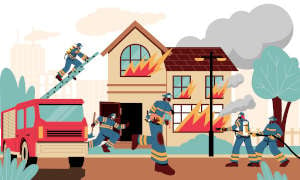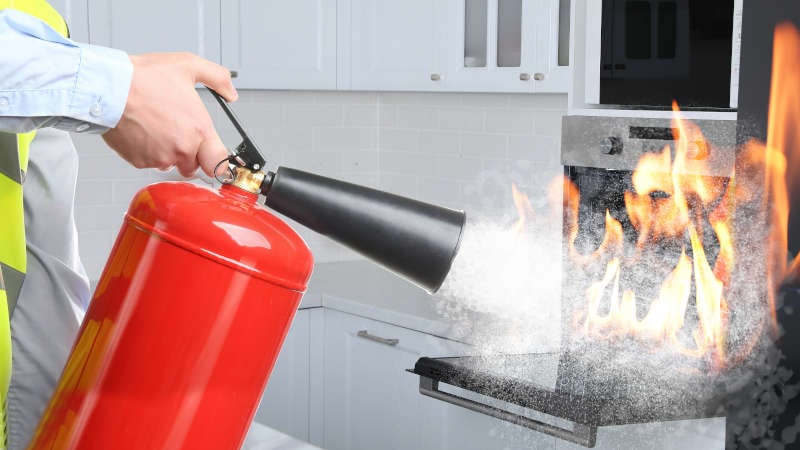Auto insurance is required in most states, but it’...
 Fire safety is an important part of keeping your family and home safe. Fires can be caused by a variety of sources including electrical malfunctions, open flames, or flammable materials left too close to heat sources.
Fire safety is an important part of keeping your family and home safe. Fires can be caused by a variety of sources including electrical malfunctions, open flames, or flammable materials left too close to heat sources.
It's essential to take certain steps to prevent fires in your home. These precautions should include identifying common household fire hazards and installing smoke alarms throughout your house.
According to the National Fire Prevention Association (NFPA), there are between 350,000 and 400,000 house fires in the United States every year, which results in almost $8 billion in annual damages.
The leading causes of home fires identified by data from the NFPA include:
Never leave the kitchen unattended while preparing foods that produce grease, such as bacon, or when cooking in oil. Most kitchen fires are caused by homeowners leaving food cooking on a burner or in an oven unattended. Typically, it is already too late to react when the fire is noticed. Clean your cookware thoroughly to avoid oil accumulating over time.

Your home's heating sources can start a house fire if they are not operating properly. Always change the filters in your air conditioner and heating systems. Keep your heaters away from anything that could catch fire, and have a professional inspect these things once a year.
More fires are started by portable space heaters every year than by central heating. Keep space heaters at least three feet away from furniture, textiles, drapes, and other combustible items when using them, and only use them in well-ventilated areas. Make sure the heater's thermostat is in functioning order, and search for versions with an automated shut-off function.
If you must use a space heater, put it somewhere level, hard, and inflammable (like a ceramic tile floor). Keep it far from any bedding or drapes, and away from carpets or rugs. Never plug a power cord into an extension cord. Instead, plug it directly into outlets.
The most common causes of electric fires are short circuits, loose connections, and arcing (sparking) that ignite building materials or overloaded circuits. Repair all worn or damaged cords immediately away. Never overload extension cords or wall sockets and do not put cords beneath furniture or rugs.
Likewise, don't try squeezing a three-slot plug to fit into a two-slot outlet. If a light switch or electrical outlet is hot to the touch or discolored, shut off the electricity to the switch or socket and replace it.
Always smoke outside and put your cigarettes out completely in an ashtray after you are done. Never just throw a cigarette butt into the trash. Always soak it in water first. Due to its explosive qualities, smoking should never be permitted in any home that uses medical oxygen.
This is a clear source of issues, but not for the reasons you might imagine. Unattended fires and incorrect fireplace maintenance are only two examples of typical fireplace issues. Failure to thoroughly clean the fireplace and chimney leading to creosote buildup is a recipe for disaster.
Another costly mistake is leaving the damper or flue closed and causing smoke damage to the house. It is also vital to be cautious around any kindling or fire-starting materials, and to avoid cooking in the fireplace.
Candles should never be left burning unattended, especially if you have pets. Due to their curiosity, dogs and cats frequently approach candles so closely that their tails or fur catch fire. They then spread the flames by running around the house.
For power outages, use flashlights rather than candles. When taper and pillar candles are two inches or less away from the holder or decorative item, put them out. Candles in votives and containers should be extinguished before the final half-inch of wax begins to melt.
Start by making it a habit to take the lint trap out of the dryer filter each time you use it. Lint buildup in dryers can obstruct airflow, increase heat, and even lead to the growth of mildew and mold. Because lint is combustible, it can easily catch fire if it gets within the thermostats, motors, or heating elements. Do not forget to wipe out the dryer vent as well, since lint can also accumulate there.
Remember that some dryers have interior ducting that, if blocked, may need to be serviced by a specialist. It is essential to get your dryer checked out right away if you notice that it's not working properly.
It is also important to have your homeowner's insurance reviewed on a regular basis. A review by a professional agent can help you better understand what is and is not covered.
It’s essential for all homeowners to take the necessary steps to prevent a fire from occurring in their homes. Following safety practices such as regularly inspecting electrical systems, ensuring appliances are used correctly, and properly storing flammable liquids away from any heat source, are key strategies when attempting to avoid potential fires before they start.
They say you get what you pay for. And you know what? They’re right. Before you let yourself feel tempted by low premiums, ask yourself what the policy is leaving out, and how it could potentially cost you in the long run.
Contact the experts at Leap Carpenter Kemps Insurance Agency. They have been in business for over seven decades and have licensed experts on hand to guide you on the best coverage for your organization. Call for a free quote today!
Auto insurance is required in most states, but it’...
No matter where you plan to travel, purchasing a t...
The majority of millennials are facing big debts, ...
Leap | Carpenter | Kemps Insurance Agency provides Commercial Business Insurance, Employee Benefits, Life and Health Insurance, and Personal Insurance to all of California, including Merced, Atwater, Los Banos, Mariposa, Madera, Fresno, Modesto, Turlock, and Stockton.
CA License Number 0646081 | Licensed to do business in California, Arizona, Hawaii, Idaho, Montana, Nevada, North Carolina, Oklahoma, Oregon, Virginia, West Virginia and Washington.
© Copyright 2023 Leap | Carpenter | Kemps Insurance Agency — Privacy Policy | Terms & Conditions.
Merced Office
3187 Collins Drive
Merced, CA 95348
Phone: (209) 384-0727
Additional Contacts
Toll Free: (800) 221-0864
Fax: (209) 384-0401